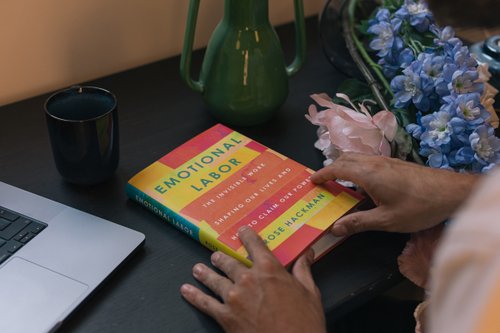Can I cure burnout on my own?
Aug 02, 2023
6 mins


Freelance translator and journalist
The term burnout was introduced in the 1970s to describe aid and service workers who felt exhausted and emotionally drained. Today, the word refers to employees in any occupation who’ve been exposed to chronic stress and experience symptoms of tiredness, cynicism, and professional inadequacy. While workers around the world suffer from burnout, they’re also inundated with advice on how to fix it themselves. But can we actually beat burnout on our own?
Jessica Rector is a keynote speaker on mental health and burnout. “It takes both [employee and employer] working together to eradicate burnout,” she says. An individual can do their part to reduce burnout, but if the employer isn’t sharing the load, burnout persists.
Rector experienced this firsthand when she worked for a Fortune 100 company in the late 90s. She was a top sales agent winning every sales award, but she was also completely drained. When Rector asked for support, her company had no system in place to help with burnout. “Within two years I quit,” she says. “I went to work for someone else with more flexibility.”
Rector believes burnout won’t just go away on its own, and thinks that “employers need to be more proactive.” According to Monster.com, 95% of workers contemplated quitting their jobs in 2021, citing burnout as the number one reason. Sally Clarke, burnout author, speaker, and coach, agrees with Rector. “There’s not enough being done to prevent burnout,” she affirms. Clarke is co-director at Human Leaders, a company helping businesses create healthy work environments.
Shame and guilt
Like Rector, Clarke also suffered from burnout. Originally from Australia, Clarke worked as a finance lawyer at a prestigious firm in Amsterdam, frequently putting in 80-hour weeks. After three years of this grueling lifestyle, she flew to Nantes in France to visit family and collapsed on the airport floor. She finally admitted to herself that she wasn’t well, that she’d been denying her burnout. She was ashamed, perceiving it as a failure on her part — as so many people do. “But it never is,” she says, “burnout is not a personal failure.”
Burnout doesn’t mean an employee isn’t working hard or smart enough, which is why employers need to play a role in reviving their burned-out employees. Clarke gives the analogy of fish in a toxic lake: If we were in charge of the lake, we wouldn’t want to remove the fish from their natural habitat. Instead, we’d clean the lake to create a safe place where the fish could thrive. Workers shouldn’t have to quit their jobs — employers need to quash toxic workplaces so employees can flourish in healthy ones. “Nine times out of ten, the onus is placed on individuals to empower and heal themselves from burnout,” Clarke says, “but on a structural level, leaders need to have a [good] work culture they’re creating.”
Over 2000 workers from 40 countries were surveyed in The State of Workplace Burnout 2023 by Infinite Potential, a non-profit think tank focused on problems in the workplace. More than one-third (38%) of participants say they’re burned out, and those working from home 80% or more of the time are burned out the most. Clarke conducted research for this study and remarks, “Remote work blew the gates off our boundaries.” To accommodate this massive shift in the way we work, it’s essential for company leaders to step up and implement burnout prevention strategies. “It takes courageous leaders to design a workflow that supports human well-being,” she says, “but this is key to preventing and ending burnout.”
Open dialogue is also essential. “Employers need to create a safe space where employees can share how they are feeling,” Rector says. If this doesn’t happen, burnout continues. While she doesn’t recommend every burned-out worker abandon ship, she urges employees who aren’t getting what they need to stand up for what they want and spend time searching for an employer whose values align with theirs. “If you’re in burnout, jumping to a new job won’t cure it,” Rector warns, “you’ll bring much of what’s causing burnout with you to the new job unless you have the perfect combination of tools and skills moving forward.”
Healing through sports and art
For Melissa Ferriter registered art therapist for special needs students, burnout didn’t lead to quitting her job. After 17 years in this role, plus an exhausting period of taking care of the mental health demands of her students during Covid, Ferriter desperately needed a reset. “I was feeling stagnant and burnt out,” she admits. She wanted to be inspired, replenished, and at the same time scratch her itch to travel, so she left Chicago to spend a week at Artful Retreats in Greece. Artful Retreats are mental wellness retreats guided by artmaking.
Ferriter was thrilled when an online search led her to certified art therapist Penelope Orfanoudaki founder of Artful Retreats. Ferriter spent six days in the summer of 2022 at a retreat in Crete where she participated in group meditation, yoga, shared meals, and artmaking. “Being unplugged was truly a gift,” Ferriter says. She believes this retreat is for anyone experiencing burnout – you don’t have to be an artist or know anything about painting or drawing to benefit.
After being rejuvenated from her time away, Ferriter went back to work with a heaviness lifted from her body. “My emotional self is more patient and open,” she says, “and I returned to my work life with a level of creative energy I haven’t had in years.” The retreat was exactly what Ferriter needed, but she made it happen without the help of her employer.
Ferriter took the initiative to reduce her burnout despite not receiving burnout support at work. “I didn’t expect my organization would pay for an international trip, but I thought they would consider a grant equivalent to the cost of a continuing education session,” she says, “however, my request for professional development was denied.”
Ferriter didn’t let this deter her even though she would have appreciated a more cooperative employer. “Hopefully I have impressed upon my supervising team what an overall valuable experience it [the retreat] was,” she says. As of now though, the burden of addressing professional burnout still ends up falling on her shoulders. Because Ferriter believes it’s essential for her to combat burnout, she’ll continue seeking opportunities like the one she had at Artful Retreats with or without the encouragement of her employer.
Unlike Ferriter, Clarke needed a complete career change. “My employer did nothing to prevent the chronic stress that led to my burnout,” she laments, “but after the company doctor confirmed I was burnt out, I received a coach and one day off every week for 12 weeks.” This wasn’t enough to curtail Clarke’s burnout though, so she decided to leave. “I would certainly have stayed if changes were made and stress levels were greatly reduced,” she confides. However, they were not. It took Clarke 18 months to transition from finance lawyer to yoga teacher and business owner, and about two years to heal and evolve from burnout. Now she’s fulfilled, healthy, and loves what she does.
If we decide to pursue recovery from burnout whether our employer is helping us or not, there are steps we can take. According to Sandrine Isoard Gautheur, associate professor of sports science at Grenoble Alpes University in France, “Burnout is a complicated problem and should be treated by a combination of interventions. ” While there’s no pill to magically cure us of burnout, moving our bodies is a good place to start. Research shows that exercise can help to both prevent and treat burnout.
Gautheur’s studies confirm this too. Co-author of “What did you do this weekend?” published in Applied Psychology: Health and Well-being, Gautheur and her team identified physical activity such as walking and team sports to be associated with lower levels of burnout and higher levels of well-being. Detaching yourself from work and relaxing on the weekends are proven to reduce burnout as well according to Clément Ginoux, assistant professor and sports psychology researcher at Grenoble Alpes University who co-authored “What did you do this weekend?” with Gautheur.
Ginoux gives an example of this detachment and relaxation. A worker in healthcare talks with clients day in and day out and grows weary of dealing with angry complaints. However, over the weekend the worker hikes in the mountains, takes in fresh scents of flowers, and enjoys the stunning nature around them. It’s simple, but being outdoors like this allows the employee to stop thinking about their job and replenish their emotional resources. Now they can return to the office happier and less stressed on Monday morning. “The effects of practicing non-work related activities on the weekend will spill over into the workweek,” Ginoux explains.
Learn to take care of yourself
He sees it this way, “There’s an element of self-responsibility.” Individuals are the main actors in healing from burnout and employers are the supporting actors. Workers have to practice self-care with the support of their companies, but if that backing isn’t there, it might be time to move on. “Good companies provide solutions to burnout,” he says. Strategies they may implement include holding burnout training, assigning coaches to workers, hosting creative events at work, and hiring yoga instructors. “Bad companies exploit their workers though and those employees will not be able to fully recover from burnout.”
With employees around the world not operating at their full capacity–mentally, emotionally, cognitively, and physically–the workforce is sick and needs healing. According to Ginoux, workers must be informed. They have to understand what burnout is, what causes it, and how it affects them. “We need to explain this to people rather than merely telling them what to do because there’s not just one way to recover–they have to find and do what fits best.”
Photo: Welcome to the Jungle
Follow Welcome to the Jungle on Facebook on LinkedIn and on Instagram and subscribe to our newsletter to get our latest articles every day!

More inspiration: Mental health

‘We need each other’: Monika Jiang on combating loneliness in hybrid work
Hybrid work offers flexibility but can leave us feeling disconnected. Monika Jiang explores how we can rebuild workplace connections.
Dec 19, 2024

Struggling at work? Here are 3 steps to rebuilding your self-esteem
Low on confidence? Learn how reflection, recharging, and refocusing can help you rebuild self-esteem and thrive professionally.
Nov 27, 2024

10 ways to beat the Sunday Scaries
Even people who love their jobs can experience the Sunday Scaries. Psychologist Karen Doll offers several strategies to help manage and overcome it.
Sep 12, 2024

Unpacking the burden of emotional labor
Rose Hackman’s "Emotional Labor" reveals how managing emotions impacts everyone, especially women and minorities.
Aug 08, 2024

Is financial anxiety harming your productivity?
Feeling overwhelmed by financial anxiety? You're not alone. Discover practical steps and expert advice to regain control of your work-life balance.
Jul 31, 2024
The newsletter that does the job
Want to keep up with the latest articles? Twice a week you can receive stories, jobs, and tips in your inbox.

Looking for your next job?
Over 200,000 people have found a job with Welcome to the Jungle.
Explore jobs